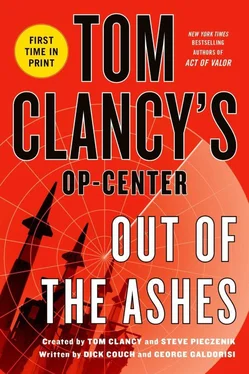Now Williams waited for the troop commander and his senior enlisted advisor. The room was Spartan, just a small conference table, padded chairs but not comfy swivels, and a complex ceiling-mounted audio-visual projector. The coffee was in a plastic foam cup and it was lukewarm, but for the new Op-Center director, it somehow felt just right. The door opened and two men of medium height and starched battledress utilities stepped into the room. Williams himself was dressed in chinos and an open-collared Oxford shirt. He rose to meet them. Once introductions were made, the three seated themselves at the table.
“I understand you may have some work for us,” Major Mike Volner began.
“I just may,” Williams replied. “Tell me, have you been briefed on my organization or why you were seconded to me?” Volner glanced at his senior sergeant and both men shook their heads. Williams smiled. “Well, this will take a bit of explaining. Before we get to that, I’d like to learn more about each of you. If you would, Major, perhaps you could tell me something about yourself.”
Williams had been the given the files on these men, as well as the rest of the troop, but he wanted to hear it directly from them. Major Michael Volner was five feet ten inches tall and weighed 160 pounds, trim but not noticeably athletically built, with brown hair and brown eyes. If unremarkable in appearance, his background was anything but that.
Following the bitter divorce of his parents when he was twelve his father, a college professor, left the country only to be killed as a bystander of a car bomb four years later while teaching in Pakistan. His mother, a stay-at-home mom, fell prey to the ravages of solitary drinking and prescription pain killers to the point of being institutionalized. Raised from fourteen on by his maternal grandmother, he felt adrift and alone. His grandmother recognized his keen intelligence and little need of others and decided not to change him, but strengthen his existing traits. She taught him contract bridge at an early age and played with him as her partner in regional tournaments. He became a prodigy, able to accurately assess multiple possibilities, gifted with unbelievably quick decision-making abilities, and an almost unbeatable opponent. He also learned to read people as well as cards.
At sixteen he became fascinated with free-form rock climbing. He frequented various climbing sites and he watched and learned without formal training. Every weekend he climbed alone, perfecting his technique and building tremendous core strength. He trained and taught his body to perform remarkable feats. Volner attended Brown University on a scholarship and entered the Army right out of college. He was not a born leader, but became a leader by example. He readily took to military life and made the most of the professional and tactical training the Army afforded its infantry officers. The Army also taught him what his grandmother did not: To be a leader, you must first be a team player, and you must care for the men you lead. Volner had been both a platoon commander and a company commander with the 82nd Airborne and the 75th Rangers. Now he was a JSOC troop commander, or what in previous times had been called a Delta Force Team Leader.
If the major was something of a smooth article, his senior sergeant was not. Master Gunnery Sergeant Moore was similar in stature, but thicker. He was older and his craggy features were capped with a dense thatch of salt-and-pepper. He bore an uncanny resemblance to the late actor Dennis Farina, something he quietly cultivated. Moore was bred for the Marine Corps. He was born at the Naval Hospital at Camp Lejeune, North Carolina, and shuffled from one Marine base to another until he was old enough to enlist. His father waded ashore with the 7th Marines of the 1st Marine Division in Vietnam in 1965. His grandfather was wounded twice at Guadalcanal and killed in action on Saipan. Two of his great uncles were at the Chosin Reservoir; one made it back. His great-grandfather was with Gunnery Sergeant Dan Daily at Belleau Wood. Moore’s Marine roots were in Battalion and Force Recon, and he was one of the plank holders of the Marine Special Operations Command he helped to establish in 2006. After five combat deployments with MARSOC, he migrated to JSOC. In one capacity or another, Master Guns Moore had been in continuous combat rotation for over a decade and a half. He was fluent in Arabic and Farsi.
Most field and senior grade officers in the Army or Marine Corps found it hard to contemplate an officer and an enlisted man with this seniority leading a combat unit that was barely half the size of a company. Yet, as Williams had recently come to understand, all that seniority and experience came into play when planning a special operations, direct-action mission. When the need arose, he would task these men with just such a mission. They would study the task given them, then plan and carry out the operation. Careful attention to training and tactical execution helped; combat experience in special operations was essential.
These were men who were not comfortable talking about themselves, but Williams drew them out. It was Moore who finally brought up the task ahead.
“Sir, I appreciate your interest in us, but can you tell us something about what you have for us, and how you think we can be of service?”
So Williams did. He gave them a short version of the old Op-Center, which they had heard about but knew little of, and a complete breakdown of what he envisioned for the future. “There may be long periods training and operational inactivity,” he concluded, “but when the call comes from Op-Center to you, you will have to be quick, professional, and I can assure you, it will be important — and most probably, dangerous. There may be a great many flyaways and prepositioning with no action. Each time you will have to move out smartly and come up with a workable plan in short order. Yet, when you are committed to an operation, it will likely be of crisis proportions. Sound fair enough?”
The two veteran warriors exchanged a glance and nodded in unison.
“Your primary liaison with Op-Center will be a retired Army man named Hector Rodriquez.” At the mention of this name, both men paused, then broke into broad smiles.
“Sergeant Major Rodriquez is on your team?” Moore blurted.
“He is,” Williams said with a straight face. It was a card he had waited to play until now. Rodriquez was a former JSOC command sergeant major. This drew a low whistle from Moore, and both men seemed to visibly relax at the mention of his name.
“Uh, I don’t know about your schedule, sir,” Volner said, “but would you like to meet the rest of the troop?”
Williams looked at his watch and took out his cell phone. He hit the speed dial and it was answered immediately. “Captain, I’m going to be a little longer than planned. Can you delay our take off for another hour or so?… Excellent … I’ll let you know and thank you.” Then, turning to Volner, he said, “Major, I’d be honored to meet your men.”
Azka Perkasa’s Condo, Kuala Lumpur, Malaysia
(August 22, 1015 Malaysia Time)
It was late summer, and Azka Perkasa was at his computer in the home office of his Kuala Lumpur high-rise condo, surfing the Web. He was looking at vacation rentals in Bali. He had recently found some joy in the purchase of relationships from an upscale, discreet service he used on occasion. Once he had confirmed a property on Bali and rented the time and space on Net Jets, he would contact the service and rent a woman for the week. If she didn’t work out, he would simply send her home on a commercial flight. The engineer in Perkasa liked both the impersonal nature and privacy this kind of arrangement afforded him. Like any man he had needs, but no one needed to know of his personal life or how he made his living — certainly not some woman retained only for pleasure. Be that as it may, this was not entirely the case.
Читать дальше












